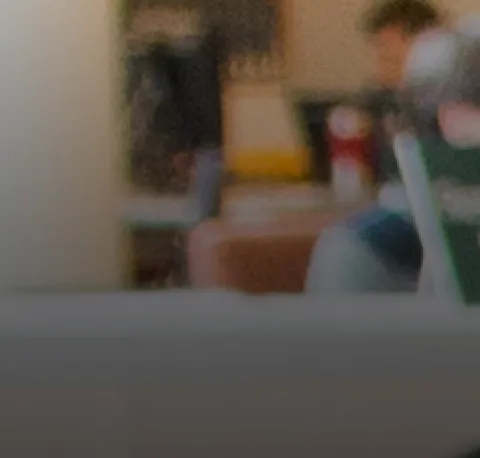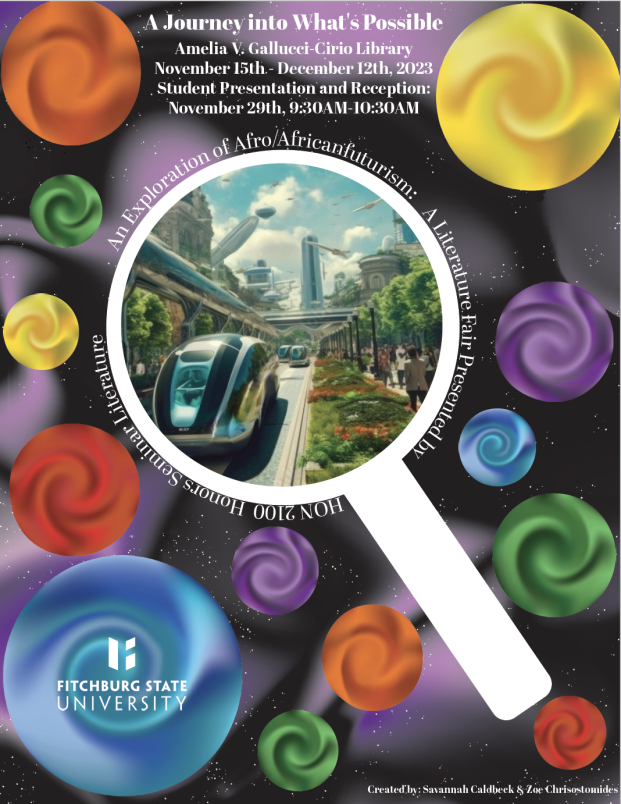A Journey into What’s Possible: An Exploration of Afro/Africanfuturism

A Journey into What's Possible: An Exploration of Afro/Africanfuturism
A Literature Fair Exhibit presented by HON 2100 Honors Seminar Literature
Location: First Floor "Reference Collection" | Amelia V. Gallucci-Cirio Library
Exhibit Dates: Wednesday, November 15th to Tuesday, December 12th
We invite the FSU community to stop by the Library to explore the work of Dr. Kisha Tracy's HON 2100 Honors Seminar Literature class poster presentations on their exploration of Afro/Africanfuturism. The posters will be available for viewing in the "Reference Collection" area in the back of the Library's first floor.
Students will be presenting their work as part of a reception on Wednesday, November 29th, from 9:30-10:30AM.
About the Literature Fair
A Journey into What's Possible: An Exploration of Afro/Africanfuturism
“No matter what we call it ... it is understood that the impetus of Afrofuturism, Africanfuturism, and Black Speculative Literature is to center African and African diasporic culture, thought, mythos, philosophy, and worldviews." - Hope Wabuke (Ugandan American writer, professor of English and Creative Writing at University of Nebraska-Lincoln)
The National Museum of African American History & Culture describes Afrofuturism, a subcategory of science fiction named in 1994, as "express[ing] notions of Black identity, agency and freedom through art, creative works and activism that envision liberated futures for Black life." In 2017, Naijaamerican author Nnedi Okorafor coined the alternate term Africanfuturism for work "specifically and more directly rooted [than Afrofuturism] in African culture, history, mythology and point-of-view as it then branches into the Black Diaspora, and it does not privilege or center the West." After the film Black Panther came out in 2018, the Zimbabwean American actress Danai Gurira, who portrays the general of the Wakandan army, Okoye, commented that her character "protects what we would have been." In this statement, she acknowledges the question she says many of African descent often ask: "Who would we have been if we weren't colonized?" This anxiety underlies one type of Afro/Africanfuturism that experiments with speculative stories about Africa or Africans that imagine if colonialism had never happened or if the history of slavery was altered or interrupted.
Okorafor also coined a related term, Africanjujuism, defined as "a subcategory of fantasy that respectfully acknowledges the seamless blend of true existing African spiritualities and cosmologies with the imaginative." She has often acknowledged and emphasized how she and others weave the real traditions and beliefs of various African peoples, including mythology and folk creatures, into their fiction, emphasizing how the heritage of traditional, premodern cultures lives and breathes in modern Africa.
This semester, students in Dr. Kisha Tracy's HON 2100 Honors Seminar Literature have been studying the genres of Afro/Africanfuturism and Africanjujuism, first by interrogating definitions and terminology and then by encountering novels, novellas, short stories, music, films, and secondary readings. In this Literature Fair, which they have named "A Journey into What's Possible: An Exploration of Afro/Africanfuturism," they share their ongoing thoughts, analysis, and research on a variety of topics.
We hope that you learn from these explorations and are inspired to take a journey into these worlds yourselves.
